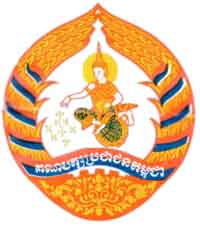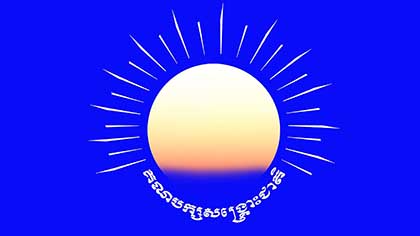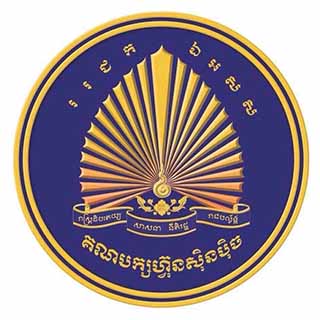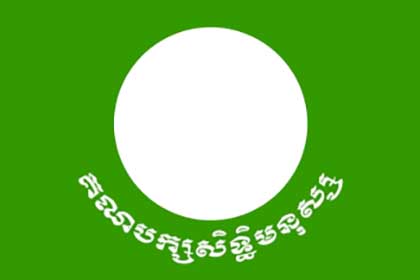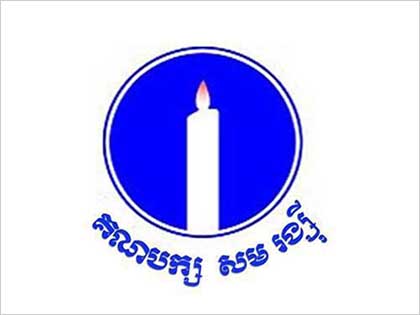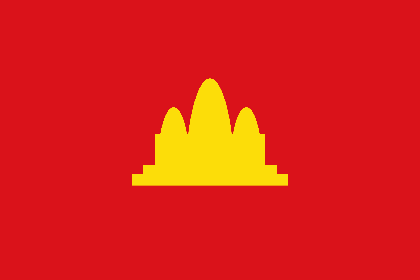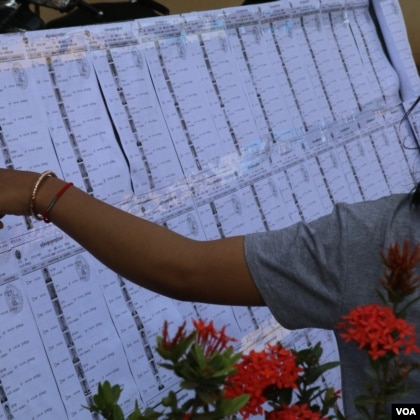
Voters verify their names at a polling station in Ariksat commune of Kandal province, which is the stronghold of the opposition CNRP. (Sun Narin | VOA Khmer)
Community Stories
Voters Spoil Ballots, Stay Home as PM Hun Sen Celebrates Landslide Victory
Election officials have yet to announce number of spoiled ballots but poll observers claim it will be higher than the 130,000 cast in 2017.
Ariksat Commune, Kandal Province While millions of Cambodians headed out to vote at thousands of polling stations across the country on Sunday, Heng, in his 50s, nursed a cup of black iced coffee and sat alone at a cafe here in Ariksat commune, Kandal province.
In the corner of the cafe, a pro-government news network shows a loop of footage of “happy” voters.
“I will not go to vote,” says Heng, who did not give his real name for fear of repercussions, tells VOA. “There’s no party that I can vote for,” he added, referring to the dissolution of the country’s only serious opposition party, the Cambodia National Rescue Party, last November.
“I am a bit afraid of being spotted by local authorities if I don’t have an inked finger, but it is my right,” he said, referring to the ink used to mark voters fingers after they cast a ballot.
In Ariksat commune, the CNRP won 2,813 votes to the ruling Cambodian People’s Party’s 2,576 in a 2017 local election, when the main opposition party won about 44 percent of the popular vote.
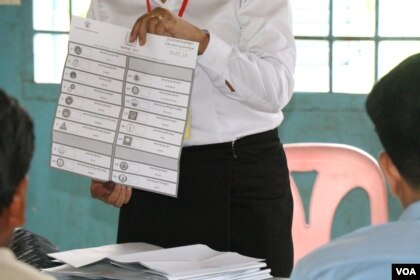
An election officer shows a ballot at a polling station after it closed in Sarikakeo commune in Lavea Am district of Kandal province on Sunday, July 29, 2018. (Sun Narin | VOA Khmer)
When some of Heng’s friends show up at the cafe, some have inked fingers and others do not. Chet, who decided to cast a vote, was wary of speaking critically about the election in public, but admitted that he had spoiled his ballot.
“Honestly speaking, I didn’t write or tick anything on the ballot,” he said. “The election is not free and fair due to the absence of the opposition party.”
“I go to vote since it is my obligation as a citizen that I have to fulfill,” he said. “If we don’t go to vote, they will accuse us of supporting the opposition party [CNRP],” he added.
“I hate that party. That is why I drew a cross since I wanted it to be an invalid ballot.”
At a polling station inside a nearby school, Sambath Kanika, 30, is selling sugarcane to children. Her finger is inked. But she said she also tried to spoil the ballot, but later realized under the rules laid out by the National Election Committee, the marks she made on the voter slip will count as a vote for the ruling party.
“I hate that party. That is why I drew a cross since I wanted it to be an invalid ballot,” said Kanika, who dropped out of school at grade eight. “I really regret it and I wanted to cry,” she added.
She said she felt pressured to attend the polling station.
“I actually didn’t want to come to vote,” said Kanika, who has two kids. “If I didn’t come, local authorities will spot me,” she added.
More than 82 percent of those registered to vote cast a ballot in the election, according to the latest figures from the NEC. In the 2017 local election, turnout was 90 percent.
The number of spoiled ballots submitted Sunday has not yet been announced by the NEC. But polling observers claimed that the number will be higher than in the local election in 2017. In 2017, there were some 130,000 invalid votes.
Here Sunday in Kandal province’s Ariksat commune, local election officials told VOA that 656 ballots were declared invalid. In the 2017 local elections, 110 ballots were designated as spoiled in this commune.
Former CNRP president Sam Rainsy, who has been living in exile since 2015, has repeatedly called on Cambodians to boycott the election through an online campaign known as the Clean Finger Campaign.
Threats and intimidation of people supporting the campaign have been reported, including the threat of withheld state services if people do not vote, despite boycotting the election being legal.
“The election is not free and fair without the main opposition party”
Thong Sarun, the former CNRP Ariksat commune chief, said voters in the area were also given bribes and pressured to vote.
“They went to vote because they are afraid that local authorities will not sign the documents for their land sale or documents for any ceremonies they have,” he said. “They want to get the ink so that they will not face any pressure.”
“The election is not free and fair without the main opposition party,” Thong Sarun added.
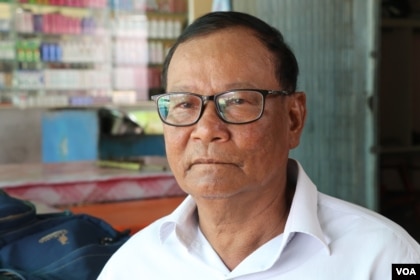
Thong Sarun, former opposition commune chief in Ariksat commune of Kandal province (Sun Narin | VOA Khmer)
On the last day of election campaigning on Friday, Hun Sen said: “Now the majority of people will go to vote. For those at the local level who don’t go to vote, how will you live with your neighbors?”
“Those who are against voting are the people who destroy the nation and democracy, which must not be forgiven,” he added.
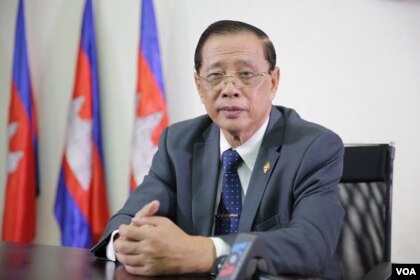
FILE: Sok Eysan, a spokesman and lawmaker of Cambodian's People Party, gave an interview to VOA in his office at CPP's headquarter in Phnom Penh on October 12, 2016. (Hean Socheata | VOA Khmer)
Sok Eysan, CPP spokesman, claimed that the party has won at least 100 National Assembly seats out of 125, a large increase from the 68 it won in 2013. “According to the election body result broadcast on television, we got more than 80 percent of the votes,” he said. “We will get at least 100 seats.”
This story originally appeared on VOAcambodia.com. (July 29, 2018)




